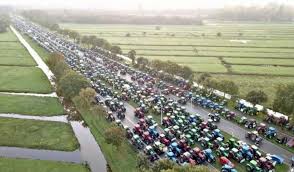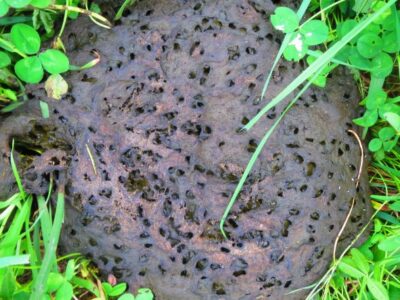by Troy Bishopp
As if farmers didn’t have enough to worry about these days, Dutch, Sri Lankan, Spain, Ireland, New Zealand and French farmers are staging heated protests over their government’s proposed “climate tyranny” action plans. The demonstrations are fueling scrutiny from North American farmers, “as only a matter of time before we’re in the crosshairs”. Suffice it to say, it’s fertile ground for conflict as farmer’s livelihoods and food sovereignty are threatened.

In the crosshairs of controversy are the Netherlands which ranks second only to the United States in global agricultural exports, and is the European Union’s largest meat exporter. What’s driving the dispute? Manure. The country has the highest density of livestock in Europe – more than four times that of the UK or France – with more than 100 million cattle, chickens and pigs in total. The Netherlands’ intensive livestock farming system produces an unusual excess of animal feces. When mixed with urine, those feces give off ammonia and nitrous oxide. This fertility is what the government authorities say “can” leak into air and water, harming local wildlife and pollute native habitats.
Environmentalists say we need to reduce the toll farming takes on nature, by eating less meat and growing crops in less harmful ways, while at the same time make our food systems more resilient to the heat, drought, storms, and flooding that will be intensified by climate change. The highest Dutch administrative court found in 2019 that the government was breaking EU law by not doing enough to reduce excess nitrogen in vulnerable natural areas, due to farming and industrial activities.
To address this situation, the Netherland government unveiled an “unavoidable transition” for agriculture to halve emissions of the gasses, as well as other nitrogen compounds that come from fertilizers or animal production, by 2030, with regions near protected nature reserves expected to cut pollution by 70% to tackle their environmental and climate impacts.
According to theGuardian.com expose, “We can’t be the tiny country that feeds the world if we shit ourselves,” said MP Tjeerd de Groot, from the Democrats 66 party, which is part of the coalition government in the Netherlands. The 13-year multibillion-euro plan, includes paying some Dutch livestock farmers to relocate or exit the industry, and helping others transition to more extensive (as opposed to intensive) methods of farming, with fewer animals and a bigger area of land. It will start as a voluntary programme, with compensation offered to livestock farmers asked to leave. “In the end, it might be necessary to stop negotiating as a last resort, but the basis is voluntary,” said de Groot.
TIME Magazine reports: “Farmers can reduce the release of nitrogen compounds by changing how they manage their cows: feeding them less protein, or using water to dilute manure, for example. But the target is expected to require a 30% reduction in overall livestock numbers, and experts say many farms will have to shut down. Farmers are demanding that the government rethink the plan before it becomes law later this year. The problem is for decades, governments have encouraged them to increase yields. Meanwhile, other high-polluting industries, such as aviation, construction, and transport, have yet to face such severe environmental rules.”
Maureen Hanson of Dairy Herd Management Magazine wrote, “The potential methods of carrying out the emission goals include voluntary buy-outs, relocation, and even expropriation – forced sale of emission rights and even land itself to the state. Dutch farmers are asking for more time and assistance in adopting emission-reducing technologies, rather than culling animals or shuttering farms altogether. Many also believe agriculture is being targeted disproportionately compared to other industries. And they view the threat of expropriation as a bad-faith act of government overreach, motivated by the government’s desire to acquire high-priced Dutch farmland cheaply.” “Cars were very polluting but they had a chance to make cars less polluting with innovation. That is what we want,” said MP Caroline van der Plas, founder of the Dutch farmers party BoerBurgerBeweging (BBB).
As reported by Jenna Hoffman of Farm Journal, Canada is following in the Netherland’s footsteps with Canadian Prime Minister Justin Trudeau unveiling a plan to cut nitrogen emissions 30% by 2030. Ireland’s government is proposing new laws which will give government the power to hinder any farmer from buying, holding or spreading fertilizer, according to the Irish Examiner. It says anyone looking to get their hands on fertilizer will have to be registered as a “professional fertilizer end user.”

North American Ag Spotlight podcast host, Chrissy Wozniak ask R-Calf’s USA CEO Bill Bullard about his perspective: “We look now at the Netherlands and here you have the government forcing a mandate upon the agricultural industry and farmers and ranchers. So what they’re doing is imposing additional production practices, standards and costs upon the industry. Now, the first to be hurt will be the small and independent sized operators in the Netherlands, large corporate operations will be able to absorb the additional cost.”
“This is really an effort to weed out more and more food producers which means we’re going to risk food security, risk food shortages, but we’re also going to promote import penetration from China or other places that don’t have such stringent standards imposed on their independent producers. And if you look back at what’s really driving this, it’s the World Banks’, it’s the Rabobank, it’s Unilever, headquartered in the Netherlands.”
Bullard empathized, “The Netherlands is ground zero, for a concerted effort by the government and by private government, private public partnerships, to force independent producers to meet standards that are today untenable, that will essentially force them out of business. And the Netherlands government says it’s not acknowledged that many farmers in the Netherlands simply will not be able to comply with these new mandates. And so this is a serious situation for cattle producers, particularly farmers and ranchers all across the world.” For the full interview visit: https://www.youtube.com/watch?v=xLF4yM0Mwb8&list=PLUIfz07FtYfT96ls5ma2jKxll2rtkr0Y6&index=4
While President Biden hasn’t declared climate an emergency, some feel it’s a waiting game. Just ask Illinois farmer Sherman Newlin. “I feel like every day is one day closer to having the President declare a climate emergency,” he says. “Once that happens, I don’t know what it will mean for ag, or what it’s going to open up the door to.”
American media has glossed over the fundamental problems occurring overseas but one might beware of the hand that feeds you.
“As the Dutch farmers’ protests have shown, in order for any climate solution to have a lasting impact, it must increase human flourishing and accelerate innovation. Bottom-up solutions that advance technological solutions can achieve these goals. Policymakers in the United States must learn from the EU’s mistakes and pursue avenues to empower farmers and ranchers to build on the success of providing more families with food at a smaller environmental cost” ~ Jeff Luse, Policy Assistant at the Conservative Coalition for Climate Solutions
Published in Country Folks Dutch farmers ‘opstand’ – Country Folks


 Co-Movement Gym Podcast S2E15 – Troy Bishopp; Grass Whisperer
Co-Movement Gym Podcast S2E15 – Troy Bishopp; Grass Whisperer »
»